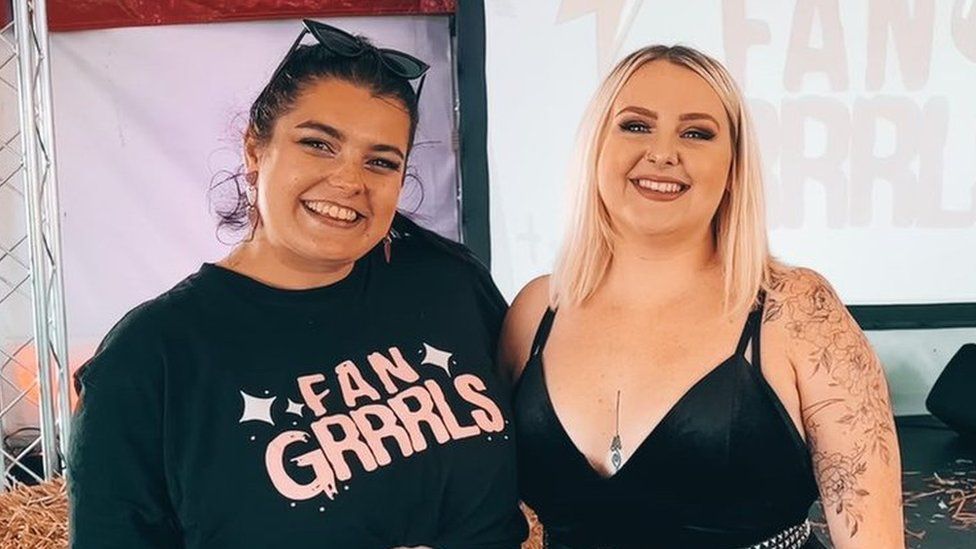'Why we're proud to be fangirls'
- Published

Ever since Beatlemania, the world has seen female fans a certain way - hysterical, obsessive and not really in it for the music. But a new research project and podcast is looking at the cultural power of "fangirls", challenging the sexism they experience and reclaiming the word as a badge of honour.
Recent tours by Taylor Swift, Harry Styles and Beyoncé have cemented the economic and cultural power of female music fans, with Swifties alone generating an estimated $5bn for the US economy last year.
Yet many women still feel they are not taken seriously within music communities.
A new research project is asking why.
It was sparked when Dani Hewitt, a senior lecturer at BIMM Music Institute Bristol, listened to an interview with Josh Francheschi from her favourite band, You Me At Six.
"When they talked about their third album and the process they went through," she says. "They reflected on it and said 'we were no longer a cute band for girls'.
"And I thought, 'what's wrong with being a band for girls?' I'm a girl, and I love your band."
After coming together with fellow BIMM lecturer and self-proclaimed fangirl Jess Dyer, the Fan Grrrls podcast was born.
So what exactly is a fangirl?
"What we're looking at is a culturally performative act of expression which is usually associated with obsession, hysteria, and most importantly, something that's very, very, hyper-feminine," says Jess.
Dani explained that the first leg of Taylor Swift's Eras tour generating so much for the US economy was "young women with their purchasing power, deciding this is what we want to spend our money on.
"And not only does that do wonders for Taylor's career, but it's upholding a significant part of the US economy.
"But still Swifties are undermined for their investment. They are seen as something to not want to be associated with, but they have massive cultural power."
In comparison, Jess said: "I completely appreciate and validate the football fan experience, but we're never going to sit here and talk about how [male] football fans are screaming their faces off, some causing fights, some causing drunken, disorderly behaviour.
"But we'll talk about the economic drive that they have for our country or their local environments or the teams."
As a female fan of rock music, Jess says it is expected "you don't have as much authority on the subject" and the "overall interactions" are "with people who just don't think that you should be there in that space".
"You don't want to be wearing the T-shirts out in public because you're constantly being interrogated for wanting to identify as something," she explained, adding: "So there is a constant feeling of being quite intimidated."
Dani used to work in the music industry and said her legitimacy was regularly questioned.
"You get comments like 'either you're the girlfriend or the groupie', 'you're a fangirl', 'you're only there to get closer to the bands', obviously for some sort of sexual relationship."
Rain Green, who is from Bristol, said as a non-binary fan "a lot of the time my voice is ignored and being a fangirl is seen as hyper feminine which can affect the way people see me and my gender identity".
"The idea that we as women can't share our excitement over something is so gross and that needs to change," they said.
"The best thing about being a fangirl is the community and seeing everyone talk about and enjoy their fandoms with such joy"
Victoria Watts, another huge music fan from Bristol, said: "When I was younger, girls were perceived as 'going through a phase' or being 'obsessed', whereas I felt my male friends were [seen as] looking at their idols or wanting to have the same musical talent."
She said recently while dancing to a woman DJ: "I remember someone telling me I should be at home with the kids. I told them I don't have kids and music is for everyone.
"I think some bands need to not be ashamed of having a big girl following. If they buy your albums and merch, what is wrong with that?"
The podcast hosts say safety is also a reason female fans have a different experience to men, but some artists are trying to bring about change.
Jess said Frank Carter and the Rattlesnakes were "doing an exceptional job of really catering to the fact that they know that they're having a lot of women in their fan base right now".
She explained they often dedicate songs to female and non-binary fans and call them to the front so they feel safe.
She said making merchandise more diverse so it appeals to a wider audience "can seem like really surface level, but it's just a really nice way of making sure there's inclusivity and interaction across their audience".
She also feels language used when talking about women needs to change and those with fans need to consider how they engage with them.
"It's coming right down to how do we fundamentally challenge the barriers that are stopping women as both workers and audience members entering the industry."
Follow BBC Bristol on Facebook, X and Instagram. Send your story ideas to us on email or via WhatsApp on 0800 313 4630.
Related Topics
- Published3 January
- Published8 December 2023
- Published23 November 2023
- Published12 May 2021